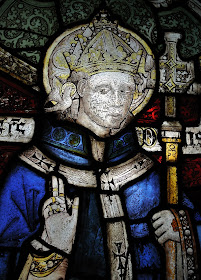
Joe had applied for a new job in a large
corporation in GB. He had gone through various stages of the application
process and now was standing before the committee who had the final word. The
first words out of his mouth after he heard the chairman’s decision were: “I
couldn’t possibly do that! Who do you think I am?” The chairman had just
offered him, not the job he had applied for but a job two paygrades above it
with tremendous responsibilities - the senior position in the whole division.
He would be running an entire dept with a huge budget. Joe didn’t feel he was
up to it and that it was beyond his capabilities. The chairman thought
otherwise and assured Joe of all the help and support he would need.
“I couldn’t possibly do that!” Now let’s
turn to today’s gospel. These words of Joe stuck in my mind as I read it. You
could say from the corporate conference room to the upper room. Jesus says to
the disciples: “Whose sins you forgive are forgiven them…” Now for a little
eisegesis, my reading into the text which I personally find helpful in
appropriating it. I can imagine the disciples, on a much more profound level
than Joe, saying something like: “Are you crazy, Jesus! Who do you think we
are? We’re only human and only God can forgive sins. “Who do you think we are?”
And it would be understandable that they would feel like this. Who in their
right mind would take on the task of forgiving sins! And Jesus responds: “You
are right. Only God can forgive sins. And God is going to forgive sins through you.” Now back to the gospel text itself. Jesus is convinced that the
disciples can do this. In fact, he is not asking them if they would like to do
it. He’s giving them a command. They are to go and do it. But, and this is essential,
this command comes only after the crucial promise and gift: “…he breathed on
them and said “Receive the Holy Spirit.”
The Holy Spirit. Jesus’ own spirit. The
Spirit which is the Father’s special gift to God’s people. And the point of
receiving the Holy Spirit is clear and obvious. The gift of the Spirit is not
essentially to give the disciples, then and now, new ‘spiritual experiences’,
although there may be plenty of these as we heard about in the first reading
from Acts. Nor is the gift of the Spirit meant to set disciples apart from
ordinary people, as some sort of holier
than thou hierarchical club. Though, to be sure, disciples are called to live
rich, full and deep lives of devotion and dedication modelled on Jesus’ own
life. But the point of the transmission of the Holy Spirit is so that
disciples, through the ages, can do in and for the world what Jesus had been
doing in Israel. “As the Father has sent me, so I am sending you.”
I would like to offer a cautionary note
here in the form of a question. How does the unique achievement of Jesus (and
it is unique; there is only one Jesus of Nazareth, a first century Palestinian
Jew). How does his unique reality and achievement (life, death and
resurrection) affect all other times and places and peoples? For it is meant to
have an effect always and everywhere. What Jesus was doing in and for Israel is
meant to continue throughout the ages. Jesus was clear: “As the Father has sent
me so I am sending you.” As the Risen Jesus says in Mark’s gospel: “Go into the
whole world and proclaim the gospel to every creature.”
The unique achievement of Jesus’ life,
death and resurrection is not meant to be limited to one particular time and
place. It is a reality, a process really, that the disciples in Jesus’ time and
in our own time are meant to be a part of and continue. And this process is not
a matter of replication or duplication. Baptism and life in the Spirit isn’t a
matter of replicating or duplicating multiple “Jesuses” throughout the ages.
There was only one Jesus of Nazareth who lived, died and rose again. And the
Holy Spirit is not some sort of spiritual toner that produces identical copies
of Jesus. The Holy Spirit, rather, enables us in our own unique, unrepeatable
lives and times to continue the reality of Jesus’ incarnation and redemption. We
believers are really meant to continue the incarnation and redemptive work of
Jesus. “As the Father has sent me, so I am sending you.”
There are lots of
images of the Holy Spirit that have been used throughout the tradition: wind,
fire, tongue, water, dove are the most scripturally based ones. However, I came
across one recently that I find particularly poignant and meaningful. It was a
reference to the Holy Spirit as God’s Midwife. A midwife is someone who assists
a woman giving birth to a child. The Holy Spirit can be seen as God’s
assistance to us as we give birth to new things in our lives; in the concrete,
sometimes challenging, circumstances of our lives today. As we continue to
enflesh Jesus Christ in and for our world.
What I find particularly helpful
about this image of God’s Midwife is the respect it shows to our personal
participation in the process. A midwife doesn’t replace the mother. A midwife
doesn’t do it for her but rather sits facing the mother offering encouragement,
advice and sometimes pressing on the mother’s abdomen to encourage the child to
come out. In the same way, the Spirit of God does not replace us. Our
initiative, our insight, our effort are all necessary. The Spirit doesn’t do it
for us. But the Spirit sits with us encouraging us, advising us and sometimes
exerting some pressure. We have to do the work. We have to be the one who pushes.
But most importantly we need to trust the Spirit’s presence. Trust that Jesus’
words are really addressed to us; no matter how inadequate or unprepared we may
feel: “Receive the Holy Spirit.” An encouraging, advising and sometimes
pressuring presence that always and unfailingly leads to new and transformed life.
Abbot Damian's homily for this Pentecost.

























